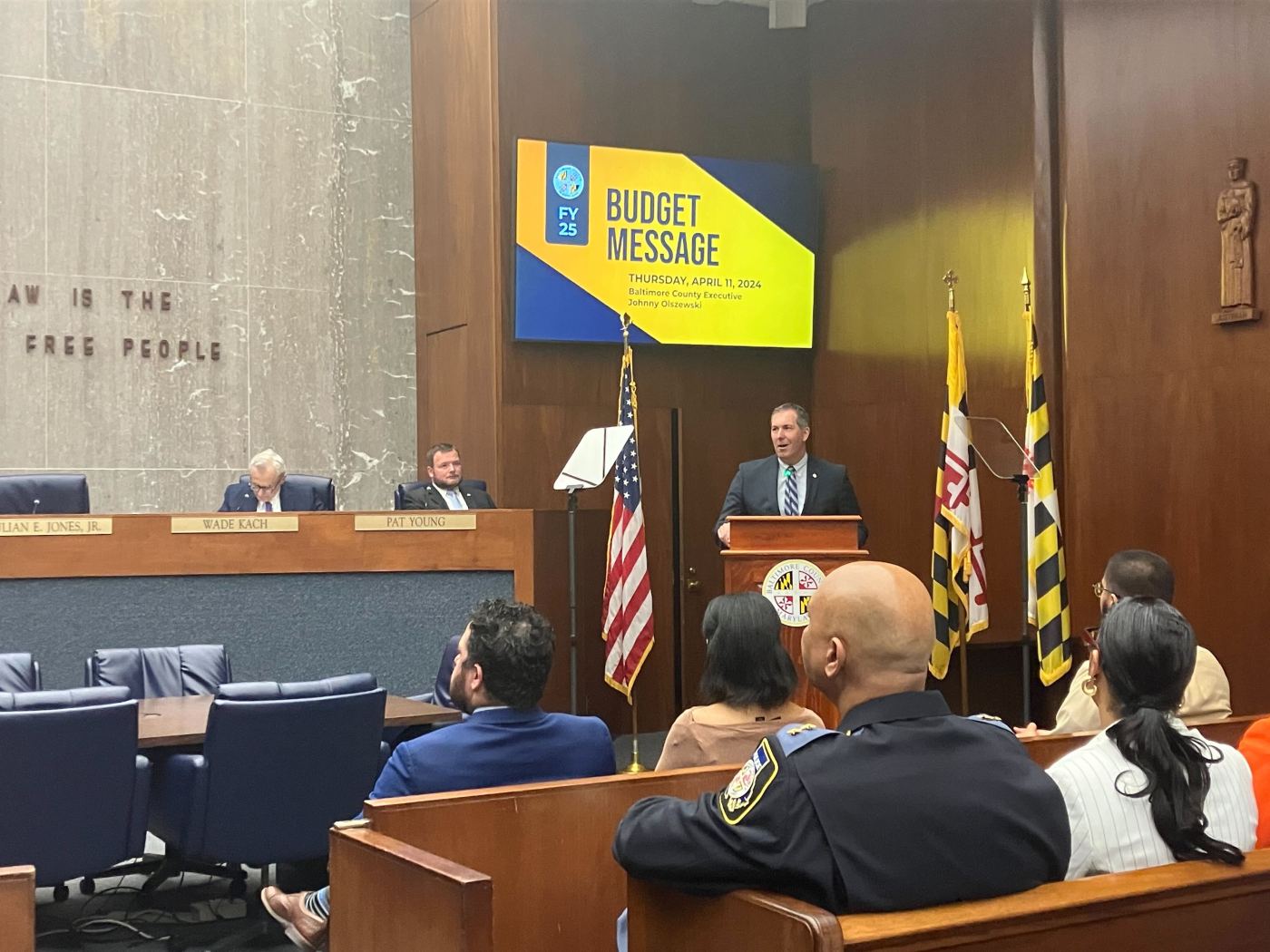Johnny Olszewski Jr. proposed on Thursday a $5 billion budget for the upcoming fiscal year 2025, which he called his sixth and “potentially last” as Baltimore County executive as he seeks election to Congress in November.
The county budget proposal, which comes with no tax increases, is slightly higher than last year’s budget of $4.9 billion. It proposes millions of dollars in increases for the Department of Parks and Recreation, public election financing system, upgraded library buildings and a new Catonsville fire station. Olszewski, a Dundalk Democrat, said he would also ask voters to approve a request on the November ballot to borrow $600 million to fund ongoing projects like senior centers, firehouses, schools, and police stations. The borrowing request is nearly $250 million more than initially anticipated. Olszewski said the county was asking for a higher amount because of “inflationary pressure.”
“It is an amount that is necessary to ensure that priority projects — already committed to — remain on track,” he said. “Without these funds … much demanded and needed projects would be delayed or deferred for years, if not outright canceled.”
The County Council, which has final budget approval, can subtract but cannot add anything to the proposal, which is composed of a $4.6 billion operating budget and a $400 million capital budget. Council Chair Izzy Patoka, a Pikesville Democrat, said the council will hold agency hearings in May and vote on the final budget May 23. The fiscal year starts July 1 and ends June 30, 2025.
Olszewski unveiled his proposal two weeks after a cargo vessel struck and toppled the Francis Scott Key Bridge, which connected southeastern Baltimore County with southeastern Baltimore City. In an emotional budget message Thursday, the county executive recognized emergency responders from the county fire and police departments who helped respond to the March 26 collision, which killed six construction workers.
“You are our heroes,” Olszewski said. “We will do whatever is needed to ensure we all weather this disaster and emerge even stronger. That is what local government does.”
He told reporters the county expects to suffer less economic damage than initially expected from the bridge collapse and Port of Baltimore closure, citing financial support from the state and federal government, and philanthropic services. Authorities said last week they anticipate restoring full port access by the end of May.
The county is also working on a legislative package to grant money to a local agency that would help the bridge victims’ families, most of whom are county residents, with services like rental assistance and grief counseling. Olszewski declined to name the agency or give details ahead of the legislative package rollout.
The budget proposal calls for a $6 million increase to Recreation and Parks’ budget, along with $35 million for new and upgraded library buildings. It budgets $11.5 million to build a new fire station in Catonsville, would fund the Baltimore County Public Schools system $41 million over its state-mandated maintenance of effort, raise teachers’ starting salaries to $60,000 and freeze community college tuition for county residents for the sixth year in a row.
Councilman Wade Kach, a Timonium Republican who recently sparred with Olszewski over housing legislation, said he was pleased with the proposal, which allows additional funding for ongoing construction on Dulaney High School in his district.
Patoka said he was also pleased the budget earmarks additional funding for volunteer fire stations and crossing guards, but worried about how the county would pay for infrastructure costs like its aging sewer system once federal COVID aid dries up. Federal American Rescue Plan Act dollars must be expended by Dec. 31, 2026.
“I’m worried about infrastructure, pipes, water, sewer, road construction,” he said. “It’s hard to tell what is in the budget because it’s not specified.”
Olszewski’s proposal sets aside $3.3 million for the county housing fund, and $1 million for its public election fund, which will allow candidates running for local office starting in 2026 to access public funding. It also bakes in a budget for every agency to have translation services. Baltimore County’s immigrant communities have gained more attention in the aftermath of the bridge collapse, as all six workers were originally from Mexico and Central America. Almost 13% of the county’s 850,000 residents are immigrants, according to a joint survey from the American Immigration Council and county Office of Community Engagement.
The fiscal year 2025 budget proposal comes five years after the then-newly elected Olszewski administration first discovered an $81 million budget deficit. In response, the county raised taxes for the first time since 1992.
On Thursday, Olszewski told reporters the discovery of the deficit issue, which he said was buried in a budget book footnote, still stung even as the county now enjoys a 14% fund balance and he faces the prospect of being elected to higher office.
“It’s about more than just whomever the county executive is,” he said. “It’s also about having the council be clear about where we are. It’s also about having clarity for our residents and for our partners in the work that they understand where we are.”






